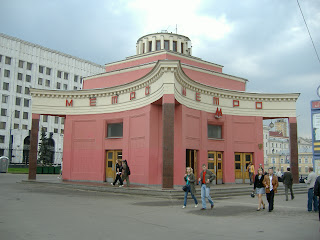Here's a first, analphabete, bibliographically incoherent stab at listing some of the books etc that fed and continue to feed into the project. During the war the Metro stations were impromptu concert halls, meeting areas and, in one case at least, a library. These works line the shelves of our underground reading room.
Poetry
Mayakovsky poem ‘A Bit of Utopia’
Brecht, ‘The Moscow Metro Workers Take Possession of the Great Metro on April 27, 1935’
Valery Syutkin, ‘42 Minutes’ (song)
E Dolmatovsky, ‘Komsomol Volunteers’ (Комсомольцы-добровольцы)
Semion Kirsanov, ‘M’ (not found yet)
Demyan Bedny ‘Moscow’ (includes section about building the Metro ; not found yet)
Fiction
Alexander Khaletski, Metro (1985)
Andrei Platonov, Happy Moscow (posthumously published, 1991)
Martin Cruz Smith, Gorky Park, Pole Star, Red Square, and Stalin’s Ghost
Fyodor Dostoyevsky, Notes from the Underground and The Double, translated with intro by Jessie Coulson (Penguin Classics)
Sergei Lukyanenko, The Night Watch (UK publication, 2007)
Venedikt Erofeev Moscow Stations (1969)
Bela Illes story ‘Fire in the Metro’ (not found yet)
Il’f and Petrov kids story about the Metro (not found yet)
E Tarakhovskaya, M (1935) children’s book (not found yet)
Lev Kassil, Miracle Beneath Moscow (19??) (not found yet)
H.G.Wells, The Time Machine, intro by Marina Warner (Penguin Classics)
Pushkin, Fairy Tales, translated by Jacob Krup and Oliver Elton, edited by Elena Shabalova (P-2 Art Publishers, St Petersburg)
Moscow Metro Travel Guide, translated by Kate Cook, ed. Elena Krishtof (Knigi WAM)
Vladimir Nabokov, Nabokov's Dozen
Michael Frayn, The Russian Interpreter
Viktor Pelevin, The Blue Lantern
Mikhail Aizenberg, Say Thank You
Lev Rubinstein, Here I Am
Jerome K. Jerome, Three Men in a Boat and Three Men on the Bummel, into by Jeremy Lewis (Penguin Classics)
Film
Komsomol Volunteers (Комсомольцы-добровольцы) (1957)
Metropolis (Fritz Laing, 1927)
Hammer and Sickle (Sergei Livnev, 1994)
Scientific Section of Pilots (Andrei E, 1996) serial killer on the metro
MMM (Eisenstein, never finished)
Pokrovvskie Vorota (1982)
Ironiya Sudbiy, Ili c Legkim Parom! (1975)
Troye v Lodke
Ballad of a Soldier, dir. Grigory Chukhrai (1959)
Travel
Jack Lindsay, A World Ahead
Alan Sillitoe, Road to Volgograd
Games
Metro-2 (based on an attempt on Stalin's life by the NKVD)
Metro-2: Death of the Leader (sequel)



























